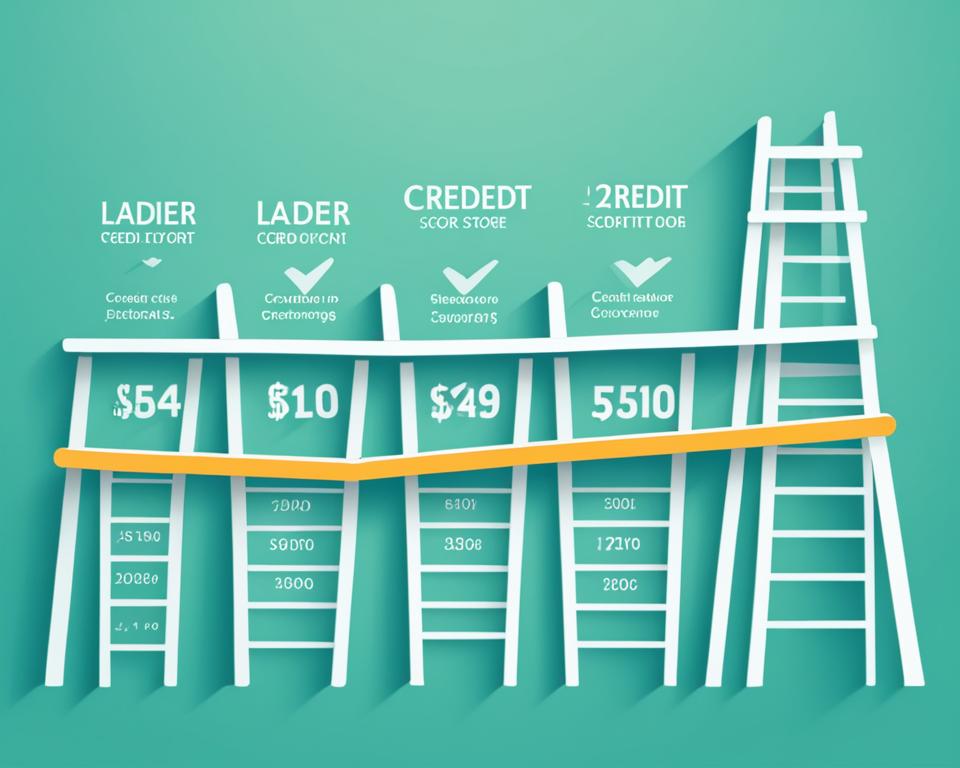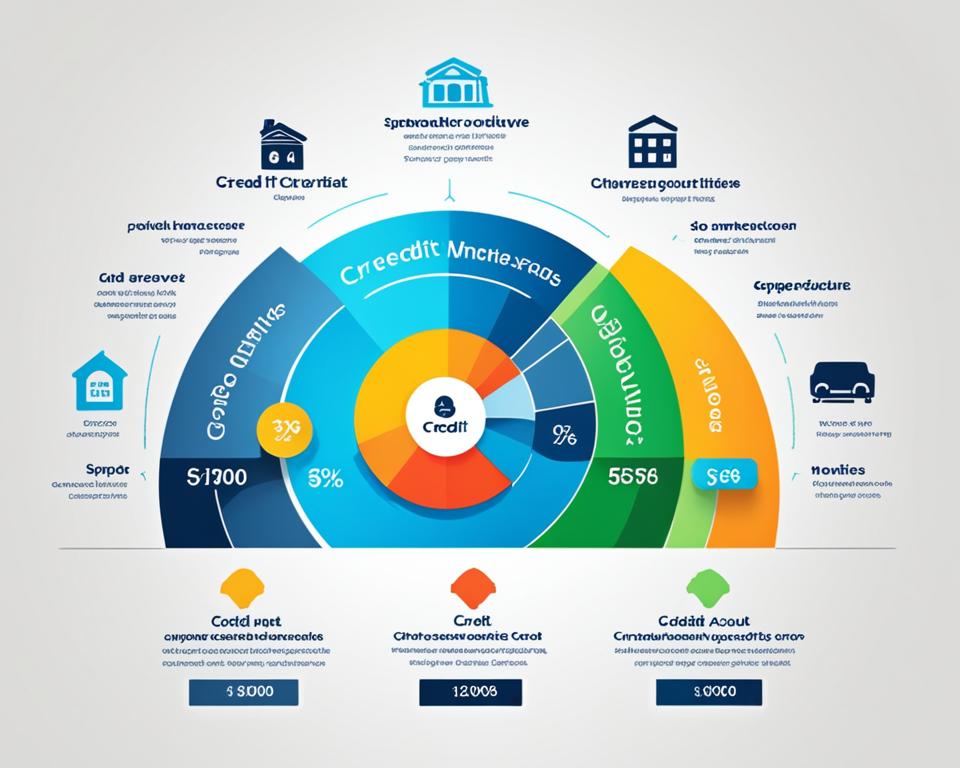Welcome to our credit repair tip series, where we provide valuable insights and strategies to help you improve your credit score and achieve financial stability. In this article, we will discuss the crucial tip of avoiding opening new accounts unnecessarily. By understanding the impact of unnecessary account openings on your credit score, you can make informed decisions that contribute to a healthier financial future.
Key Takeaways:
- Opening new accounts unnecessarily can have a negative impact on your credit score.
- Resisting the temptation of new accounts is essential for faster credit repair and rebuilding.
- There are alternative strategies for building credit without relying on new accounts.
- Closing accounts strategically can be beneficial for credit repair.
- Regularly monitoring and maintaining good credit habits is crucial for sustaining credit score improvements.
Now, let’s delve deeper into why opening new accounts can impact your credit score and explore effective alternatives and strategies for credit repair and rebuilding.
Why Opening New Accounts Can Impact Your Credit Score
When it comes to credit score improvement and implementing the best credit repair strategies, understanding the impact of opening new accounts is crucial. Many individuals are unaware of how this seemingly innocent action can have negative consequences on their creditworthiness. Let’s delve into the reasons why opening new accounts can significantly affect your credit score.
Credit scores are influenced by various factors, including payment history, credit utilization, length of credit history, and new credit inquiries. Each time you open a new account, it triggers a hard inquiry on your credit report, which can lower your score by a few points. These hard inquiries indicate that you are actively seeking new credit, raising concerns for lenders about your borrowing behavior.
“Avoiding unnecessary account openings is one of the best credit repair strategies you can implement to safeguard your credit score.”
Furthermore, new accounts can also impact your credit utilization ratio, which is the percentage of credit you use compared to your total available credit. Opening new accounts increases your overall credit limit, but if you continue to accumulate debt, it can negatively affect your utilization ratio. High credit utilization is seen as a risk by lenders and can result in a lower credit score.
To illustrate this further, let’s compare two hypothetical scenarios. In the first scenario, John decides to open multiple new credit card accounts without any specific need. As a result, his credit score decreases due to the hard inquiries and increased credit utilization. On the other hand, Sarah avoids opening unnecessary accounts and focuses on responsibly managing her existing credit. Her credit score remains stable and shows gradual improvement over time.
By understanding the impact that opening new accounts can have on your credit score, you can make informed decisions that align with your credit repair goals. Remember, it’s essential to prioritize responsible credit usage and avoid unnecessary account openings to maintain a healthy credit profile.
The Temptation of New Accounts and Its Risks
When it comes to credit repair, the allure of opening new accounts can be hard to resist. The idea of obtaining new credit and the potential benefits it may bring can be tempting. However, it’s important to understand the risks involved and consider alternative strategies for rebuilding credit. By avoiding unnecessary new account openings, individuals can promote faster credit repair and achieve long-term financial stability.
“A common misconception is that opening new accounts is a quick fix for repairing credit. However, this approach can backfire if not approached cautiously.”
Opening new accounts can have several negative effects on credit scores. First, it can lower the average age of credit, which is a factor used to calculate creditworthiness. Additionally, new accounts may result in hard inquiries on credit reports, which can further impact scores. Furthermore, mismanaging new accounts or accumulating high balances can worsen credit utilization ratios, another crucial element in credit scoring models.
Resisting the temptation of new accounts is essential for effective credit repair. Instead, individuals should focus on implementing proven strategies to rebuild credit. By following these tips, you can repair your credit faster without relying on unnecessary new accounts:
1. Create a Budget and Stick to It
Developing a realistic budget and adhering to it is crucial for controlling your finances and managing debt responsibly. A budget will help you allocate funds effectively and prioritize debt repayment, ultimately improving your creditworthiness over time.
2. Pay Bills on Time, Every Time
Consistently making timely payments on all obligations, including loans, credit cards, and utility bills, demonstrates financial responsibility to lenders and credit bureaus. Setting up automatic payments or reminders can help ensure you stay on track.
3. Reduce Debt and Utilization Ratios
Paying down existing balances can significantly impact your credit scores. Aim to keep your credit card balances below 30% of the available credit limit. Lower utilization ratios indicate responsible credit usage and can lead to credit score improvements.
4. Monitor Your Credit Reports
Regularly checking your credit reports allows you to identify and address any errors or inaccuracies promptly. By monitoring your credit history, you can also detect potential fraud or identity theft, mitigating any negative impact on your credit scores.
Implementing these tips and resisting the temptation of new accounts will set you on the path to faster credit repair and successful credit rebuilding. By focusing on responsible financial habits and utilizing alternative strategies, you can achieve optimal credit health and long-lasting financial well-being.
| Pros of Resist New Accounts Temptation | Cons of Opening New Accounts |
|---|---|
|
|
Steps to Improve Your Credit Score Without New Accounts
Improving your credit score doesn’t always mean opening new accounts. In fact, there are several steps you can take to boost your creditworthiness without resorting to unnecessary account openings. By implementing these credit repair tips and tricks, you can see positive outcomes and work towards a better credit score.
1. Pay Your Bills on Time
One of the most crucial steps to improve your credit score is to consistently pay your bills on time. Late payments can have a significant negative impact on your creditworthiness. Set up payment reminders or automatic bill payments to ensure you never miss a due date.
2. Reduce Your Credit Card Balances
High credit card balances can negatively affect your credit utilization ratio, which is an important factor in your credit score calculation. Aim to keep your balances below 30% of your credit limit. Paying down your balances and keeping them low can help improve your credit score.
3. Review Your Credit Reports
Regularly reviewing your credit reports allows you to identify and address any errors or inaccuracies that could be negatively impacting your credit score. Dispute any incorrect information and work towards resolving any outstanding debts or delinquencies reported.
4. Diversify Your Credit Mix
Having a diverse credit mix shows lenders that you can manage different types of credit responsibly. If you don’t have a lot of credit diversity, consider adding a new type of credit, such as a personal loan or a secured credit card, to your credit portfolio.
5. Use Credit Wisely
Using credit responsibly and wisely can greatly contribute to improving your credit score. Avoid maxing out your credit cards, applying for multiple new credit accounts, or impulsively making large purchases that could strain your financial capacity.
| Credit Repair Tips and Tricks | |
|---|---|
| Pay bills on time | Review credit reports |
| Reduce credit card balances | Diversify credit mix |
| Use credit wisely |
By following these steps and implementing these credit repair tips and tricks, you can improve your credit score without the need for unnecessary account openings. Remember to be patient and persistent, as improving your credit score takes time and dedication. With consistent efforts, you’ll be on your way to better credit health.

Alternative Strategies for Building Credit
If you’re looking for credit repair advice and tips for rebuilding your credit, it’s essential to explore alternative strategies that don’t rely on opening new accounts. While opening new accounts can be a useful method, there are other proven methods shared by credit repair experts that can help you improve your credit score without the need for unnecessary account openings.
One alternative strategy is to become an authorized user on someone else’s credit card. By piggybacking off their positive credit history, you can benefit from their responsible card usage and prompt payments. However, it’s crucial to choose a trusted individual with good credit habits to ensure the best outcome for your credit repair journey.
Utilizing secured credit cards is another effective method for rebuilding credit. These cards require a cash deposit that serves as your credit line, reducing the risk for the card issuer. Making regular payments and maintaining a low credit utilization ratio can help establish a positive payment history, boosting your credit scores over time.
“Becoming an authorized user and using secured credit cards are both excellent ways to rebuild credit without relying on new accounts. These strategies can help individuals improve their credit scores and demonstrate responsible financial behavior.”
It’s important to note that while these alternative strategies can be effective for credit repair, they still require responsible financial habits and consistent payments. Regularly monitoring your credit reports and addressing any inaccuracies is equally crucial for successful credit rebuilding. By implementing these credit repair advice and tips for rebuilding credit, you can take steps towards a healthier credit profile and financial future.
Tips for Rebuilding Credit
- Focus on making timely payments for all existing credit accounts.
- Keep credit card balances low and aim for a low credit utilization ratio.
- Regularly monitor your credit reports for any errors or discrepancies.
- Pay off existing debts strategically, starting with high-interest accounts.
- Avoid closing old accounts as they contribute to your credit history length.
- Seek professional credit repair services or consult with a financial advisor if needed.
Assessing the Impact of Closing Accounts
When it comes to credit repair advice, one common misconception is that closing accounts can have a positive impact on your credit score. However, the reality is often more nuanced. While closing accounts strategically can be beneficial, it’s important to understand the potential impact it can have on your credit.
Firstly, closing accounts can affect the length of your credit history. Your credit history plays a crucial role in determining your credit score, and the longer your credit history, the better. When you close an account, especially one that has been open for a long time, it shortens the length of your credit history. This can potentially lower your credit score.
Additionally, closing accounts can also impact your credit utilization ratio. Your credit utilization ratio is the amount of available credit you’re using compared to your total credit limit. It’s recommended to keep this ratio below 30% to maintain a good credit score. When you close an account, it reduces your total available credit, which can result in a higher credit utilization ratio if you have outstanding balances on other accounts. This can negatively impact your credit score.
However, there are situations where closing accounts strategically can be beneficial. For example, if you have unused credit cards with annual fees or high-interest rates, closing those accounts can help you save money and avoid unnecessary financial burden. It’s essential to carefully assess the potential impact on your credit score and make an informed decision based on your specific circumstances.
“Closing accounts without careful consideration can have unintended consequences on your credit score. It’s crucial to weigh the potential benefits against the potential drawbacks before making any decisions.”
Ultimately, credit repair advice emphasizes the importance of maintaining a healthy credit mix and utilizing credit responsibly. Instead of focusing solely on closing accounts, consider alternative strategies for improving your credit score, such as paying down balances, disputing inaccuracies on your credit report, and practicing good financial habits.
| Pros of Closing Accounts | Cons of Closing Accounts |
|---|---|
| Save money on annual fees | Shorten credit history |
| Avoid high-interest rates | Increase credit utilization ratio |
| Reduced financial burden | Potential impact on credit mix |
Monitoring and Maintaining Good Credit Habits
When it comes to credit repair, monitoring your credit reports regularly and maintaining good credit habits are essential. These practices can help you stay on top of your credit health and support your journey towards better financial stability. By following some simple yet effective credit repair advice and credit repair tips and tricks, you can take control of your credit and achieve your goals.
Regular Credit Report Monitoring
One of the first steps towards credit repair is to monitor your credit reports regularly. By checking your credit reports from the three major credit bureaus – Experian, TransUnion, and Equifax – you can identify any errors, inaccuracies, or signs of identity theft that may be impacting your credit score. Make sure to review your reports thoroughly, highlighting any discrepancies or issues you come across.
Remember, you can access one free credit report from each bureau annually at AnnualCreditReport.com.
The Power of Consistent Payments
Consistently making payments on time is crucial for credit repair. Late or missed payments can have a negative impact on your credit score. To ensure you stay on track with your payments, consider setting up payment reminders or automatic payments. This way, you can avoid any unnecessary late fees and maintain a positive payment history.
Managing Your Credit Utilization Ratio
Your credit utilization ratio, which is the amount of credit you are using compared to your total credit limit, plays a significant role in your credit score. Aim to keep your credit utilization ratio below 30% to demonstrate responsible credit usage. If you have high balances on your credit cards, consider creating a plan to pay them down strategically.
The Importance of Diverse Credit
A diverse credit mix can also contribute to credit repair. Lenders like to see a mix of different types of credit, such as credit cards, loans, and mortgages, on your credit reports. By responsibly managing different credit accounts, you can show lenders that you can handle various types of financial obligations.
“A diverse credit mix can demonstrate your ability to handle different types of financial responsibilities.”
Regularly Reviewing Your Budget
Keeping an eye on your budget is key to maintaining healthy credit habits. By regularly reviewing your income, expenses, and financial goals, you can make informed decisions about your spending and ensure that you are allocating your resources wisely. This proactive approach can help you avoid unnecessary debt and stay on track towards achieving your credit repair goals.
In summary, monitoring your credit reports regularly and maintaining good credit habits are crucial elements of the credit repair process. By staying vigilant, making consistent payments, managing your credit utilization ratio, maintaining a diverse credit mix, and reviewing your budget regularly, you can set yourself up for success in improving your credit score and achieving long-term financial stability.
Conclusion
In conclusion, one of the most valuable credit repair tips is to avoid opening new accounts unnecessarily. Throughout this article, we have highlighted the negative impact that unnecessary account openings can have on your credit score. By refraining from opening new accounts without purpose, you can significantly improve your credit score and maintain healthier finances.
Opening new accounts may seem tempting, especially when enticing offers are presented. However, it’s crucial to understand the risks involved and the potential harm to your credit score. Instead of relying on new accounts, take proactive steps to improve your credit score without resorting to unnecessary openings.
Consider alternative strategies for building credit, such as becoming an authorized user or utilizing secured credit cards. These methods have been proven to be effective and can help you on your journey to credit repair and rebuilding. Additionally, carefully assess the impact of closing accounts to ensure you maintain good credit repair practices without negatively affecting your credit score.
Remember, monitoring your credit reports regularly and maintaining good credit habits are equally important. By keeping a close eye on your credit and practicing healthy financial habits, you can sustain the progress you’ve made in improving your credit score. Take control of your credit health and implement the necessary steps to achieve better financial well-being.
FAQ
Why is it important to avoid opening new accounts unnecessarily?
Opening new accounts unnecessarily can negatively impact your credit score. It can lower the average age of your accounts, increase your credit utilization ratio, and make you appear riskier to lenders. It’s best to only open new accounts when necessary and to manage them responsibly to maintain a healthy credit score.
How does opening new accounts affect your credit score?
Opening new accounts can have a negative impact on your credit score in a few ways. It can lower the average age of your accounts, which accounts for 15% of your credit score. It can also increase your credit utilization ratio if you have higher balances across multiple accounts. Additionally, it can raise concerns for lenders if they see recent account openings, which may indicate a higher risk of credit dependence.
What are the risks of succumbing to the temptation of new accounts?
Succumbing to the temptation of opening new accounts can lead to financial pitfalls. It can result in higher levels of debt, missed payments, and a lower credit score. It’s important to resist this temptation and focus on improving your credit score through responsible financial habits rather than relying on new accounts.
What steps can I take to improve my credit score without opening new accounts?
There are several steps you can take to improve your credit score without resorting to opening unnecessary new accounts. These steps include paying your bills on time, reducing your credit card balances, disputing any errors on your credit report, and diversifying your credit mix. Additionally, regularly monitoring your credit report and maintaining good credit habits will contribute to credit score improvement.
Are there alternative strategies for building credit without opening new accounts?
Yes, there are alternative strategies for building credit that don’t involve opening new accounts. Becoming an authorized user on someone else’s credit card can help you build credit history. Another option is utilizing secured credit cards, which require a cash deposit as collateral and can help establish or rebuild credit. These strategies, along with responsible credit management, can contribute to improving your credit score.
What is the impact of closing accounts on credit scores?
Closing accounts can potentially impact your credit scores, particularly if they were your only or oldest accounts. Closing accounts can shorten your credit history, potentially increasing the credit utilization ratio and negatively affecting your credit score. It’s important to assess the impact before closing accounts and consider other credit repair strategies.
How can I monitor and maintain good credit habits?
Monitoring your credit reports regularly and maintaining good credit habits are essential for supporting the credit repair process. You can monitor your credit reports for free through annualcreditreport.com and sign up for credit monitoring services. To maintain good credit habits, make payments on time, keep credit card balances low, avoid applying for unnecessary credit, and regularly review your credit reports for errors or fraudulent activity.





